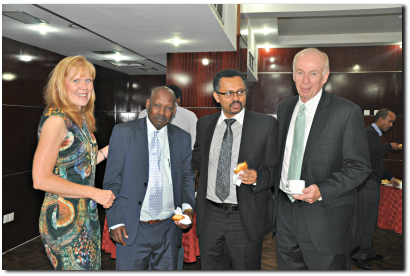
Left to right: Christine Cole, new Vice President and Executive Director of CJI; Abdi Mumed Hassen, Director General of the Ethiopian Prison Service; Pastor Daniel Gebreselassie, CEO of Justice for All - Prison Fellowhsip Ethiopia; John Larivee, CRJ's President and Chief Executive Officer.
In August, John Larivee, CRJ’s President and CEO, joined a team from the Program in Criminal Justice (PCJ) at Harvard’s Kennedy School of Government to assist correctional agencies in Ethiopia to develop a comprehensive approach to successfully help inmates transition from incarceration back to mainstream society. John was accompanied by Christine Cole – a new Vice President and Executive Director of CRJ’s Crime and Justice Institute (Christine will begin her tenure in November 2014). This work is part of a project funded by the United Kingdom’s Department for International Development focusing on strenghening the safety and justice systems of the Federal Democratic Republic of Ethiopia.
The assignment was to work with a group of key stakeholders on 2 objectives:
1. To better define the scope and nature of prisoner reintegration in Ethiopia.
2. To develop an agenda that would make for improvements to current practices.
Over the course of two days the team worked with officials from a number of leading agencies, including: Ministry of Federal Affairs, Ministry of Justice, Federal Prison Administration, Federal Judicial Training Center, Justice and Legal Systems Research Institute, Prison Fellowship Ethiopia – Justice for All, regional prison commissions of Amhara, Oromia, Tigray and the Southern Nations, Nationalities and Peoples Region.
The team reached a shared understanding of the goals of reintegration:
- Promote economic self-sufficiency for former inmates, enabling them to legally provide for their material needs and contribute to the economic development of the society.
- Nurture social cohesion, in particular healthy relationships between former inmates, their families and the community of care.
- Reduce the incidence of criminal recidivism by supporting behaviors that produce positive outcomes for the society and a decreased desire to re-offend.
From the meetings and a visit to federal prison, the team learned much of the challenges facing the correctional leaders, as well as their willingness to learn from the expreience of others and to advance change within their organizations.
At the end of the visit a set of next steps were developed, including a possible visit to CRJ programs.